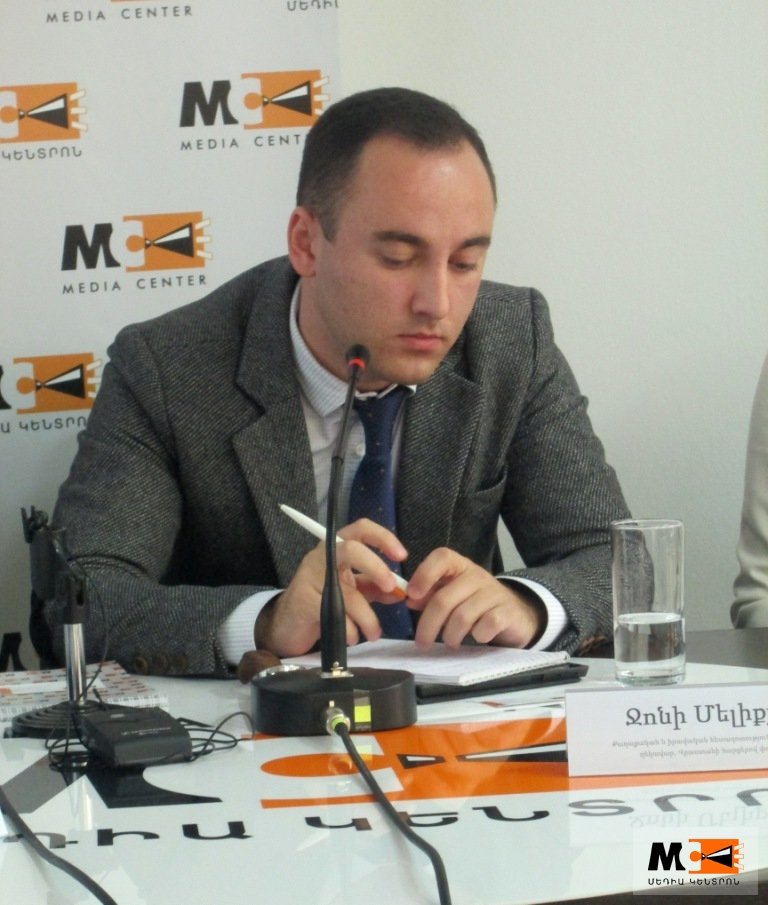Armenian expert: Iran can’t be ignored in coalition against Daesh

TEHRAN - Johnny G. Melikyan, a political analyst at the Armenian Center for Regional Studies (CRS) of Public Administration Academy, believes that the great powers including the new U.S. administration should know that the only way to defeat Daesh is to form a large coalition, which includes NATO, Russia, Turkey, Iran, Arabs, etc.
He also predicts that the Iranian gas export to Georgia and Armenia will be increased through the Iranian–Armenian gas pipeline in the coming years.
Following is the text of Desai’s interview with the Tehran Times:
Q: Can the war against Daesh succeed without an inclusive coalition?
A: There is a hope that in a near future world powers and regional prayers will realize, that the only way to struggle Daesh in Syria and Iraq is a large coalition, including all interested actors such as NATO member states, Russia, Turkey, Iran, Arab states, etc.
Q: The Iranian Oil Ministry has said before that it may supply gas to Georgia through the existing pipelines in Azerbaijan and Armenia. However, Russia media reported on February 7 that President Vladimir Putin has ratified a deal to build the Turkish Stream natural gas pipeline to southern Europe. Could this be seen as a rival plan to Iran’s gas export to Eastern European states like Georgia?
A: We live in a world where each country is trying to carry out its own national interests, realizing them for the benefit of stability and prosperity of its own people. Exceptions are neither Iran nor Russia. The recent decision of official Moscow to join the Turkish gas distribution network and pipelines, which are coming from Azerbaijan, is a project that in the long term perspective will influence IRI’s ability to export natural gas to Europe. Another competitor is Azerbaijan with the Shah-Deniz 2.
It should be mentioned, that Islamic Republic of Iran consumes about 95-97% of its own gas. British Petroleum report (2015) shows, that only in 2014 Iranian gas output increased to 172,6 billion cu. m, in a case, when 170,2 billion cu. m of that gas consumes within the country. That is why for more than a decade, Iran has even been importing gas from Turkmenistan (4.7 billion cu. m only in 2013), which actually makes it possible for Tehran to export gas to Turkey. The same is in a case of Southern Caucasus, where Iran only exports a limited volume of gas by pipeline to Armenia and Azerbaijan. At the same time, it should be mentioned, that in a short term perspective, Iran does not have enough natural gas to increase its gas export to the European and South Caucasian energy markets. On the other hand, Iranian gas is expensive in a comparison with Russian, Turkmenistan or Azerbaijani. Positive thing is that earlier official Tehran has announced, that is planning in the period of 2016-2020 to increase the natural gas production from 240 billion cu.m (in 2016) to 340 billion cu.m (in 2020). Gas export, at the same time will also be increased sevenfold to 70 billion cu.m.
About the Georgian energy market, I can say, that today, Azerbaijan has a gas monopoly in Georgia and in future that situation will remain the same, because of the government’s expectation from Shah-Deniz 2, which (after 2019) will cover more than 60% of the Georgian gas consumption only (approximately 40% will be imported also from Azerbaijan). Armenia, as far as Turkey, will remain the main directions of Iranian gas export and here we can expect increase of gas supply from IRI. 140 km long Iran-Armenia Natural Gas Pipeline will continue to import Iranian gas and Yerevan will continue to export Armenian electricity vie 3 power-lines (3-rd is planning to build in a near future).
Q: Tbilisi has tried to close its cooperation with NATO since the 2008 crisis, and now President Trump has said the U.S. is no longer able to pay the membership fees of Eastern European states which are members of NATO. In view of such developments and remarks how do you see the future of the military bloc?
A: The Georgian government was shocked by the winning of Donald Trump in the U.S. presidential elections. Till the recent contacts of the Georgian Prime Minister Giorgi Kvirikashvili with Vice-President Pence in Germany, during the Munich Security Conference, there was skepticism in Tbilisi that the new cabinet in the U.S. will decrease its interest in the region of Southern Caucasus. But after recent contacts, especially NATO defense ministerial meeting in Brussels, now it is clear that nothing has changed globally and the U.S. will continue to help Georgia in the long road of its Euro-Atlantic integration. The only transformation at this moment I see the approach of Washington on the issue of increasing the military spending of the NATO member states (minimum 2 percent of GDP). It is a challenge for some of the nations, but here I see the beginning of a new and unprecedented process within the organization since the collapse of the Soviet Union.
Leave a Comment